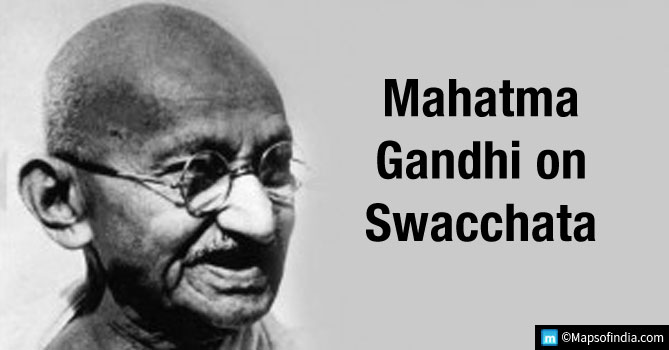
Mahatma Gandhi once said, “The charge had often been made that the Indian was slovenly in his habits and did not keep his house and surroundings clean. . . . But I had some bitter experiences. I saw that I could not so easily count on the help of the community in getting it to do its own duty, as I could in claiming for its rights. At some places, I met with insults, at other with polite indifference. It was too much for people to bestir themselves to keep their surroundings clean. To expect them to find money for the work was out of the question. These experiences taught me, better than ever before, that without infinite patience it was impossible to get the people to do any work. It is the reformer who is anxious for the reform, and not society, from which he should expect nothing better than opposition, abhorrence and even mortal persecution.”
He became conscious of this reality very early in his life and continued to feel so till the end of his days. He was aware of the fact that the condition of cleanliness and sanitation in India was really poor, and the scarcity of adequate toilets in most of the rural regions required as much effort as was needed to attain Swaraj. He further added that unless we “rid ourselves of our dirty habits and have improved latrines, Swaraj can have no value for us.” He continued his struggle for cleanliness, sanitation and effective management of wastes in South Africa and then in India while fighting for Swaraj in India. After a year of the attainment of Independence in 1947, Gandhi was assassinated but his idea of sanitation and cleanliness continued to be propagated in both letter and spirit.
It was initially an idea but took the shape of a national mass movement after the launch of the Swachh Bharat Abhiyan by the Prime Minister Narendra Modi in 2014. While addressing the citizens of India on Independence Day in 2014, PM Modi talked about of ‘Swachh Bharat’ in his speech. He said, “How do we celebrate the 150th birth anniversary of Mahatma Gandhi? – – – Mahatma Gandhi had cleanliness and sanitation closest to his heart. Whether we resolve not to leave a speck of dirt in our village, city, street, area, school, temple, hospital, and what have you, by 2019 when we celebrate the 150th anniversary of Mahatma Gandhi? This happens not just with the Government, but with public participation. That is why we have to do it together.” The scheme came into force on 2 October 2014 as nationwide sanitation campaign, ‘Swachh Bharat Abhiyan’ to make India an absolute swachh country by 2019. Modi said that the Swachh Bharat mission is stimulated by patriotism and is beyond politics. This idea turned the thoughts of the people to Gandhi’s idea of cleanliness.
Importance of cleanliness and sanitation in Gandhi’s life
India became independent under the guidance of Mahatma Gandhi, but his desire for a clean India is still unfulfilled. He said “Sanitation is more important than independence” and further added, “So long as you do not take the broom and the bucket in your hands, you cannot make your towns and cities clean.” Cleanliness and sanitation was an integral part of the Gandhian way of living. He saw a dream of total sanitation for all. He considered cleanliness as an important aspect for the physical well-being and a healthful environment. Therefore, it is very essential to learn about hygiene, cleanliness, and sanitation. The habits which a person imbibes at a young age goes a long way with the person and becomes a part of his personality. He stressed the fact that cleanliness promotes good health among people. Keeping this idea of cleanliness and sanitation in his mind, Mahatma Gandhi said, “I will not let anyone walk through my mind with their dirty feet.”
Though Gandhi strongly ridiculed many western customs except for sanitation. While staying in the west, he was impressed by the level of sanitation followed by the people. This made him really keen to introduce that type of cleanliness in India as well. Directing to the unhygienic habits of the Indians, Gandhiji strongly stressed observing cleanliness in toilets, and wrote, “I shall have to defend myself on one point, namely, sanitary conveniences. I learnt 35 years ago that a lavatory must be as clean as a drawing-room. I learnt this in the West. I believe that many rules about cleanliness in lavatories are observed more scrupulously in the West than in the East. The cause of many of our diseases is the condition of our lavatories and our bad habit of disposing of excreta anywhere and everywhere. I, therefore, believe in the absolute necessity of a clean place for answering the call of nature and clean articles for use at the time. I have accustomed myself to them and wish that all others should do the same. The habit has become so firm in me that even if I wished to change it I would not be able to do so. Nor do I wish to change it.”
There were several practical encounters of Gandhi with the subject of cleanliness and sanitation. One of the encounters was in 1915when he went to participate in the Kumbh Mela in Haridwar. He was there not as a pilgrim but as a volunteer to do sanitation work. Although he was overjoyed by the piousness of the thousands of devotees who came there to have a plunge in the sacred Ganga, at the same time, he was also in distress by the unhygienic habits of the people, and even more by the filthy conditions in Haridwar. He said, “I had gone there full of hope and reverence. But while I realized the grandeur of the holy Ganga and the holier Himalayas, I saw little to inspire me in what man was doing in this holy place. To my great grief, I discovered insanitation, both moral and physical. …There is a defilement of the mighty stream even in the name of religion. Thoughtless ignorant men and women use for natural functions the sacred banks of the river where they are supposed to sit in quiet contemplation and find God. They violate religion, science, and laws of sanitation.”
The first sight of Gandhi’s non-acceptance of Hindu orthodoxy is mentioned in his autobiography when he questions his mother, who disallow him to touch an ‘untouchable’. Gandhi refuted the idea of linking cleanliness with untouchability and found it extremely unfair to look scavenging as of the lowest social status. He strongly emphasized the need for education on the issues of hygiene and sanitation among Indians and stated that “the scavenger’s work must be our special function in India.” He insisted that “Everyone must be his own scavenger.”
Gandhi, at a political conference in Gujarat, had drawn attention to the fact that the unclean roads, houses, and streets are what makes the epidemics to develop in our homes. He said, “If we could banish the plague from India, we shall have increased our fitness for Swaraj”. He stressed on driving out plague from India by adhering to drinking clean water, breathing pure air and explicit methods to deal with the open defecation.
How Gandhi’s stay in South Africa influenced his ideas on sanitation and cleanliness?
Gandhi’s passion to demolish the twin ‘evils’ of untouchability and insanitation burgeoned in South Africa itself. For him, cleanliness drive was a fundamental segment of the society which has the potential to bring about a casteless society. While addressing the issue of manual scavenging and untouchability, he said “Everyone is his own scavenger”, and this ideology is a must for making a clean and healthy society and removing the untouchability. Sanitation was considered an essential component by Gandhi as that it has the ability to eliminate the tag of ‘unclean’ attached to the Indians, who were in dire need of the West’s civilizing mission.
His Satyagraha campaign comprised of his anxiousness about the issues of private and public sanitation. It became a priority for him to eliminate the proclamation made by whites that Indians were unhygienic and should be kept isolated. To deal with such situation, he wrote an open letter to the Natal legislative assembly in which he stated that the Indians are as much capable of maintaining the same quality of sanitation as the Europeans, provided they get the same kind of recognition and chance. However, he was aware that Indians lacked cleanliness in their way of living and emphasized on the need for the Indians to consider cleanliness as the core thing. He indulged in discussions relating to the issues of hygiene and cleanliness in all his meetings with the Indians while addressing the issue of untouchability.
While staying in South Africa, Gandhi supported scavenging and disseminated this idea among Indians and prompted them to spread dry dust or ashes in buckets after each use and to keep lavatories clean and dry. In his ‘Guide to London’, while highlighting the need for a daily bath, he quoted the proverb, “Cleanliness is next to godliness”. In his another article “Our insanitation”, he stated, “Swaraj can only be had by clean, brave people.”
Bringing together the subjects of cleanliness, untouchability and national supremacy, Gandhi laid down the directions of what he saw as the quintessential free Indian society.
Conclusion
Selecting Mahatma Gandhi as an icon of Swachh Bharat, India has once again re-established its conviction in the Father of the Nation. Gandhi was an eminent revolutionary in every way, without the agitation usually associated with a revolutionary. The efforts of Gandhiji in promoting cleanliness and sanitation a part of every India’s life are commendable and worth praising. He personally took the torch of sanitation drives in his hands in India as well as abroad to attain the revolution he wanted to see. As the 150th birth anniversary of Mahatma Gandhi is approaching next year, it is the responsibility of every Indian to vigorously participate in making India a clean country to accomplish his dream for the preservation of the environment and for a healthy future.
Related Links:
Nathuram Godse and Assassination of Mahatma Gandhi
5 Famous Speeches of Mahatma Gandhi
What was the Gandhi-Irwin Pact?





